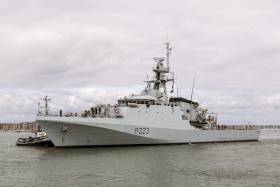Displaying items by tag: Arklow Cargoship
Following the Rockall fishery dispute that grabbed the headlines last week, the UK's newest Fishery Patrol Vessel (FPV) completed a delivery voyage from Scotland to its homeport of Portsmouth today, writes Jehan Ashmore.
HMS Medway arrived on Solent waters this morning. The newbuild is the second of five new British Royal Navy Batch 2 River-class offshore patrol vessel (OPV) currently under construction on the Clyde at BAE Systems Scotstoun yard.
The final Batch 2 river class OPV HMS Spey was on Friday taken out of the shipyard's Block Outfit Hall and positioned onto the hard stand ready to be loaded onto the launch barge.
BAE's shipyard is located upriver of the striking multi-award winning Riverside Museum in Glasgow where Afloat visited the iconic building designed by the Iranian born architect, the late Zaha Hadid.
As for the design of the HMS Medway and its future function, according to the Royal Navy they they will not use the Batch 2 class primarily for safeguarding fishing stocks in home waters but ‘forward deploy’ around the world. In addition to fishery duties, the class are designed to carry out counter-terrorism and anti-smuggling requirements in order to safeguard the UK's borders.
The new class each of 2000 tonnes will according to Naval Technology are to replace the Royal Navy’s current River-class patrol ships, including HMS Clyde, Severn, Tyne and Mersey. See report of Dublin Port call of the Liverpool based OPV and related role in the UK Government's Brexit contingency fund plan.
Leadship of the class is HMS Forth which like the rest of the class could find themselves on patrol in the Atlantic, the Caribbean, Mediterranean or the Pacific rim operating from Singapore.
In December HMS Medway took its first sea trials along the Firth of Clyde and from where Afloat last Friday had traced the OPV back to the Faslane Naval Base on Gare Loch having departed the previous day. Faslane is the homeport of the Royal Navy's Trident class nuclear powered submarines.
The course set by HMS Medway also revealed further sea trails exercises that took place in the southern waters of the Firth of Cyde. This involved an area between Ardrossan in Ayrshire and Ailsa Craig, an impressive rocky islet.
On the following day (Friday) HMS Medway was tracked by Afloat when its reached the centre of the St. Georges Channel. It is in these waters where the temporary Rosslare-Fishguard ferry Stena Nordica (deputing for Stena Europe) had already proceeded beyond mid-channel during a routine morning sailing to the Pembrokeshire port in south-west Wales.
According to AIS system, HMS Medway achieved a speed of 24.9 knots while in relatively close quarters of an Irish flagged dry-cargoship the Arklow Cliff. At just three metres shorter in length compared to the 90m naval newbuild, the 2,999grt cargoship had too set a southerly course.
Arklow Cliff Afloat featured its launch just two years ago and on this occasion as an operational ship was tracked underway while making a more sedate speed of 11.9 knots. By coincidence Arklow Cliff was bound for the River Medway where the town and Port of Rochester is located about 30 miles east of London.
Arklow Cliff likewise of HMS Medway had departed its last port last Thursday, but from Warrenpoint in Co. Down. The short-sea trader arrived in the north Kent port yesterday having sailed along the Thames Estuary from where on the southern shore the cargoship entered the Medway to approach Rochester.





























































